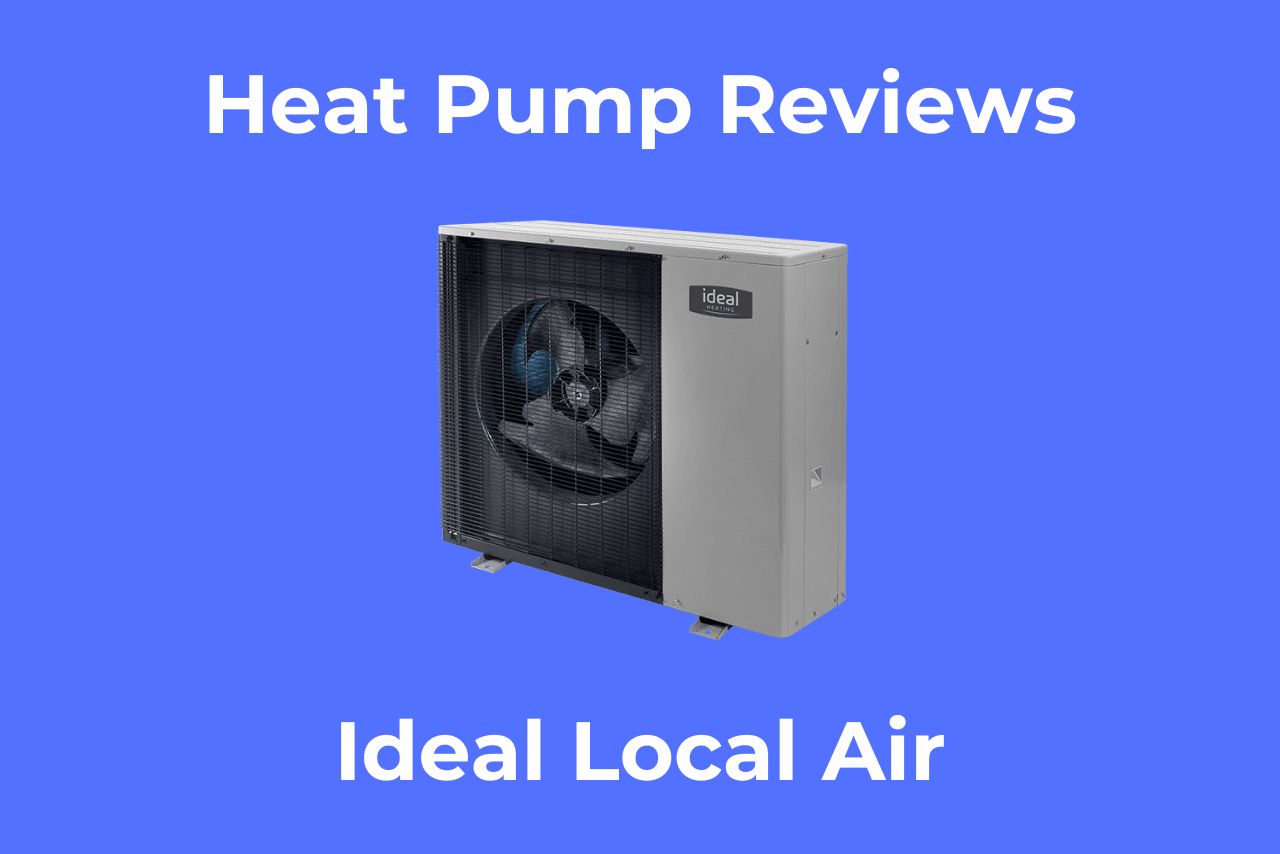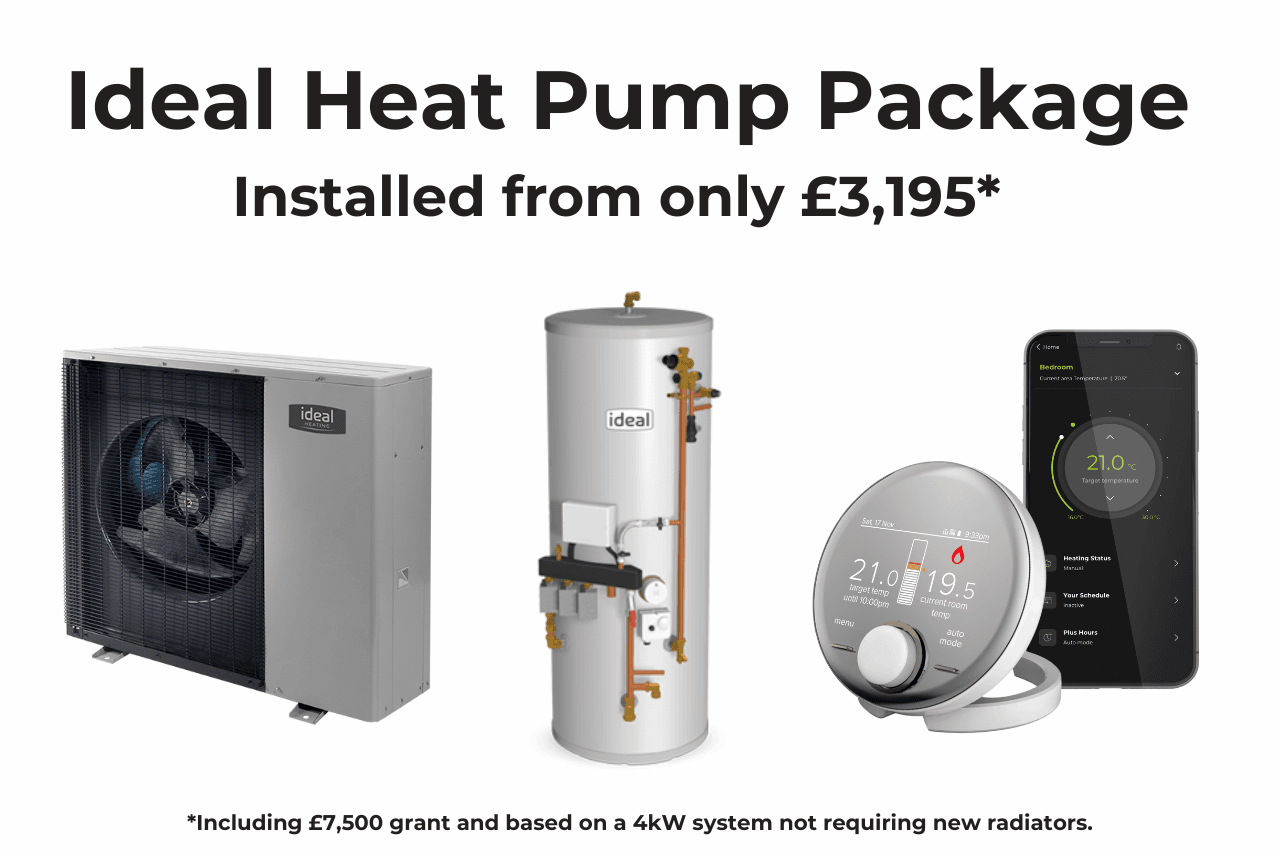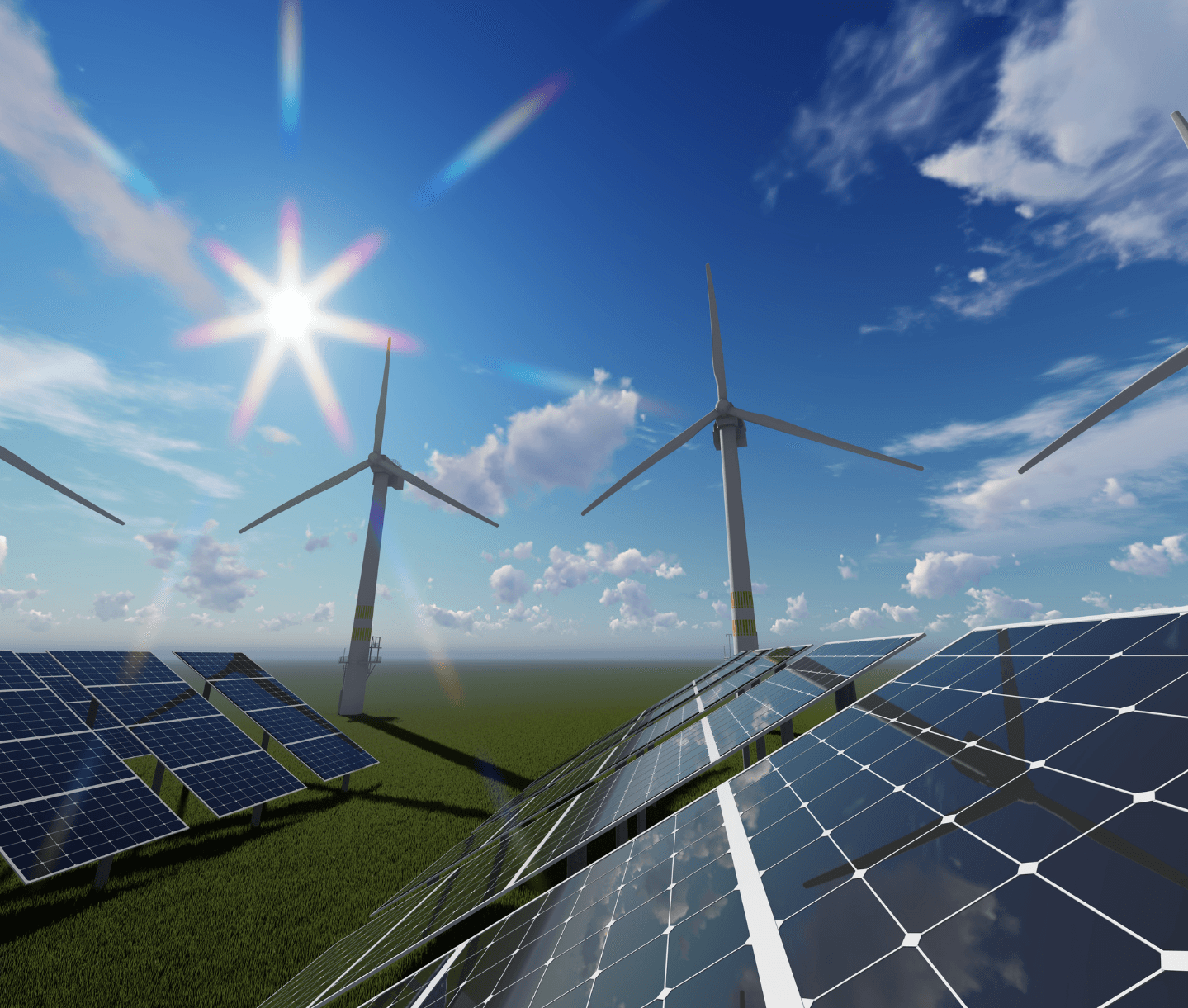If you are just starting your journey to consider air source heat pumps the following article will help explain how they work, help reduce bills, create more comfortable homes and reduce our reliance on fossil fuels.
What are air source heat pumps and how do they work?
An air source heat pump uses a unit of electricity to convert air into 3-5 units of equivalent heat. It does this in the same way your home fridge does the opposite. A compressor heats a closed water cycle to heat your home and water tank to give you a constant supply of heating and hot water.
The main unit sits outside the property, similar to the air conditioning units you see abroad, and has a water cylinder located inside your home to supply instant hot water for your daily needs.
Instead of burning gas and pumping almost boiling water throughout your home when required, a heat pump will run a constant loop of water at 40-50c. This means the whole home maintains a comfortable temperature of around 21c year round whilst also keeping the water tank hot and ready to use.
Because the system uses electricity instead of burning gas, often coupled with a renewable source of electricity, it results in zero fossil fuels being used.
You can learn more about the technical aspects by reading our ‘How to Heat Pumps Work? Beginner’s Guide’ article.
Should an Air Source Heat Pump reduce my energy bills?
Depending on your homes heat loss and existing radiators you should expect a heat pump to run at 3.5 - 5 efficiency. This means for every kW of electricity used the heat pump will generate 3.5kW-5kW of heating to your home. It’s worth remembering that gas is typically 3 times cheaper than electricity, unless you opt to fit solar, so you will need to achieve over 3X efficiency to see a saving on your monthly bills.
That’s why your heat loss assessment is really important because you can see if your existing insulation levels and radiator sizes are sufficient to achieve an efficiency high enough to work out cheaper than an alternative.
If your heat loss calculation suggests a lower efficiency you can look at ways to improve this such as insulation measures.
How much can I save?
Depending on your homes heat loss and your current heating source you should see a positive saving each month. We normally help clients achieve £500-£1000 per year but it really does depend on your home and usage.
How much does a heat pump cost to install?
The government is currently offering £7,500 towards qualifying installations which means a mid tiered brand on a 3 bedroom home can be installed for under £3,000.
However, you may need to also change radiators, pipe work and top up your insulation.
In our experience we would recommend you budgeted £4,000-£10,000 for a full system which will see you save money and keep your home at the perfect temperature.
What are the best heat pump brands?
We personally recommend several brands including Valliant, Samsung, Ideal and Mitsubishi. At the core they are all similar in terms of technology however there are some subtle differences with efficiency, monitoring, noise levels, ease of maintenance, after sales support and price.
Because the core technology is the same you can pretty much assume you get what you pay for with the more expensive options having some advantages over several factors.
Our personal favorite at time of writing is the Ideal Heating brand. They are extremely quiet units with excellent after sales support and warranties as standard.
We love the fact it’s a British manufacturer with a large presence through the UK.
A really nice extra is the Halo smart stat they supply which makes monitoring and setting up your system really simple.
Because we are a preferred installer they actually work one of the cheaper systems in our range too.
Read our full review of the Ideal Heat Pump package below.

Are heat pumps noisy?
There’s been a lot of talk in the press about heat pumps being noisy so its a common question that people have. Depending on where your heat pump unit is fitted you can expect it to be a quiet hum in the background when it is running.
Most manufacturers state the noise levels are between 58db-65db which as a comparison is similar level to someone having a conversation. To put things into perspective a gas flu is actually louder at around 80db-90db.
Positioning the heat pump is important which is why when installed correctly the noise has little effect on you or your neighbours.
Should I install solar panels with a heat pump?
100% yes if you budget allows. We almost always recommend solar to be paired with a heat pump as it’s the perfect partnership.
You use electricity to run a heat pump. Electricity can be expensive to buy from the suppliers. Solar generates free electricity during the daytime.
If budget is a factor of course it’s not required and you could fit solar at a later date. There’s also some rare situations where we wouldn’t recommend solar such as some roof structures or on some listed buildings, etc.
However on the whole solar makes a really great compliment to a heat pump installation.
What is a heat loss calculation?
When you switch off your heating you will notice after a while the room gets colder. This is because heat is literally escaping your home and the money you spent producing it gets lost to the elements outside.
A heat loss calculation will work out how much heat you need to generate to keep a comfortable temperature when taking into account the rate you are losing heat through your floor, walls, roof, windows and doors.
It’s vital you calculate this accurately before considering a heat pump because, unlike gas boilers, which just fire up and supply peaks of output, heat pumps work by supplying a more efficient lower temperature constantly.
You can use this heat loss calculation to then understand how much heat you need to generate to compensate for the amount of loss happening in the property.
You might also use this calculation to find some areas you can improve, such as insulation to reduce your heat loss and require less energy usage.
The heat loss assessment takes around 2-3 hours to complete and entails the assessor measuring the room volumes, building materials used, location and property type. This information is then run through software to calculate the total annual heat loss and heat loss per square meter. Once you have this number you can pick the right size heat pump.
Are there any grants available for air source heat pumps
There are currently grants of £7,500 available to qualifying homes. If you use an MCS installer, replace any existing heating system with an Air Source Heat Pump will typically be eligible for this grant.
Will I need to change my radiators or plumbing?
Technically the answer is no. However you want to ensure your radiators and pipework are sized correctly to get the maximum heat output.
A traditional heating engineer should have also designed a system in the same way however many plumbers don’t carry out heat loss calculations which means you might need to replace some of your plumbing if you want to get the best outcome.
Because heat pumps run at a lower temperature the radiators make a bigger impact so you should expect there might need to be some changes made.
What heat pump package does Wise Hive recommend?
We can install many different brands depending on your requirements. Our most popular package at the moment is from Ideal Heating with package prices starting from only £3,195 including fitting and the BUS grant.



